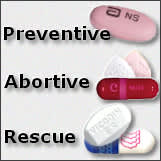
Discussing Migraine medications can get confusing, partly because there are so many, partly because they're used for different purposes. Migraine medications fall into three categories -- preventive medications, abortive medications, and rescue medications.
Preventive Medications
Preventive medications are taken daily to reduce the frequency and severity of Migraine attacks. Most doctors recommend preventive medications if you average three Migraines a month or more, or if your Migraines are especially debilitating. Some people are naturally reluctant to start taking a daily medication that may need to be taken indefinitely. Here's where we need to stop and think a bit. Migraine is a genetic neurological disease, not just having bad headaches. Most people aren't so reluctant to take daily medications for diseases such as diabetes or thyroid disease. Once we get our heads around the fact that Migraine is a disease, resistance to taking daily medications seems to lessen.
There are only four medications that have been officially approved by the FDA for Migraine prevention:
- Inderal (propranolol), a beta blocker originally developed for heart disease and high blood pressure
- Blocaden(Timolol),另一个测试版
- Depakote and Depakote ER (divalproex sodium), a neuronal stabilizing agent, also known as an anticonvulsant, originally developed for seizure disorders
- Topamax (topiramate), another neuronal stabilizing agent
除了那些批准偏头痛预防的人外,FDA还批准了治疗(预防)的OnaboTulinumtoxin A(Botox)chronicMigraine.
对于偏头痛预防,有许多其他药物(总共超过100种)。对于他们首次发达的条件以外的条件规定的药物非常常见。这被称为标签规定。用于偏头痛预防的药物规定的标签包括:
抗高血压(血压药物)
- α-2激动剂,如克拿尼丁(Catapres)
- ACE Inhibitors such as Lotensin and Monopril
- β受体阻滞剂,如Lopressor和Corgard
- Calcium Channel blockers such verapamil, Cardizem, and Plendil
抗组胺药如富人(临时转肽)
Antidepressants
- Tricyclic antidepressants such as amitriptyline
- SSRI antidepressants such as Lexapro
- SNRI antidepressants such as Effexor
- 毛明抗抑郁药如nardil
- Cox-2 Enzyme Inhibitors such as Celebrex
- Soma和Zanaflex等肌肉松弛剂
- Neuronal stabilizing agents (anticonvulsants) such as Keppra and Zonegran
- Leukotriene Blockers such as Singulair and Accolate
- Medications generally used for ADD such as Adderall and Strattera
- Medications developed for dementia or Alzheimer's disease such as Namenda
- Dietary supplements such as Coenzyme Q10, vitamin B2 and magnesium
Abortive Medications
Abortive medications actually work to stop the Migrainous process itself, thus stopping the associated symptoms as well. Migraineurs may still experience the Migraine postdrome, that phase that some people call a "Migraine hang-over." Migraine abortives include:
- Triptans: Imitrex, Maxalt, Zomig, Amerge, Axert, Relpax, and Frova
- 奥格丹胺,如近端鼻腔喷雾和DHE-45(可注射)
- 苏Isometheptene化合物ch as米德林. Midrin and all but one Midrin equivalent medications have been pulled from the market. It's uncertain if any will remain, but an equivalent medication can be made by a compounding pharmacy.
In a few cases, triptans are used for Migraine prevention. Amerge and Frova have been studied and proven effective for the prevention of menstrually triggered Migraines when taken twice a day for five to seven days beginning two days before the onset of the menstrual period.
2008年4月15日,介绍了曲坦的新变化,Treximet。TREXIMET结合了SUMATRIPTAN(IMITREX)和Naproxen钠,NSAID。这种组合的目的是苏酸曲坦靶向偏头痛中涉及的神经和血管,而萘普生钠靶炎症。
Rescue Medications
抢救药物是那些脱毛失败的人,或者如果你不能服用中止的药物。大多数救援药物是止痛药。其他类型的药物也用于通过减少恶心并帮助偏头痛放松来帮助通过偏头痛。他们没有能力中止偏头痛,但希望在偏头痛运行课程时持续几个小时内掩盖疼痛。用于救援的药物包括:
- Butalbital compounds: Fiorinal, Fioricet, etc. (with or without codeine)
- 乙酰氨基酚,用可待因,羟考酮或氢码,如vicodin,percocet,tylenol#3
- Other analgesics (pain relievers) such as Ultram, ketorolac (Toradol), and others
- 在某些情况下,医生将规定在紧急情况下的家庭中使用的注射药物如Demerol。
- Antinausea medications such as Compazine, Phenergan, Reglan
- Muscle relaxants such as Soma, Skelaxin, Zanaflex
把它包裹起来
Which medications are part of your regimen depends on you and your Migraines. Migraineurs with infrequent mild to moderate Migraine may do fine with abortive medications only. There are also some in that situation who can even manage with a mild pain reliever. For those whose Migraines are frequent, the most effective regimen will include preventives to reduce the frequency and severity of Migraines, abortives to stop Migraines as they occur, and rescue medications to help avoid trips to the emergency room if abortives fail. Some Migraineurs, particularly those with a history of cardiovascular disease, may not be able to use abortives and will need to limit their regimens to preventive and rescue medications.

